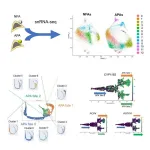(Press-News.org) Score another one for artificial intelligence. In a recent study, 151 human participants were pitted against ChatGPT-4 in three tests designed to measure divergent thinking, which is considered to be an indicator of creative thought.
Divergent thinking is characterized by the ability to generate a unique solution to a question that does not have one expected solution, such as “What is the best way to avoid talking about politics with my parents?” In the study, GPT-4 provided more original and elaborate answers than the human participants.
The study, “The current state of artificial intelligence generative language models is more creative than humans on divergent thinking tasks,” was published in Scientific Reports and authored by U of A Ph.D. students in psychological science Kent F. Hubert and Kim N. Awa, as well as Darya L. Zabelina, an assistant professor of psychological science at the U of A and director of the Mechanisms of Creative Cognition and Attention Lab.
The three tests utilized were the Alternative Use Task, which asks participants to come up with creative uses for everyday objects like a rope or a fork; the Consequences Task, which invites participants to imagine possible outcomes of hypothetical situations, like “what if humans no longer needed sleep?”; and the Divergent Associations Task, which asks participants to generate 10 nouns that are as semantically distant as possible. For instance, there is not much semantic distance between “dog” and “cat” while there is a great deal between words like “cat” and “ontology.”
Answers were evaluated for the number of responses, length of response and semantic difference between words. Ultimately, the authors found that “Overall, GPT-4 was more original and elaborate than humans on each of the divergent thinking tasks, even when controlling for fluency of responses. In other words, GPT-4 demonstrated higher creative potential across an entire battery of divergent thinking tasks.”
This finding does come with some caveats. The authors state, “It is important to note that the measures used in this study are all measures of creative potential, but the involvement in creative activities or achievements are another aspect of measuring a person’s creativity.” The purpose of the study was to examine human-level creative potential, not necessarily people who may have established creative credentials.
Hubert and Awa further note that “AI, unlike humans, does not have agency” and is “dependent on the assistance of a human user. Therefore, the creative potential of AI is in a constant state of stagnation unless prompted.”
Also, the researchers did not evaluate the appropriateness of GPT-4 responses. So while the AI may have provided more responses and more original responses, human participants may have felt they were constrained by their responses needing to be grounded in the real world.
Awa also acknowledged that the human motivation to write elaborate answers may not have been high, and said there are additional questions about “how do you operationalize creativity? Can we really say that using these tests for humans is generalizable to different people? Is it assessing a broad array of creative thinking? So I think it has us critically examining what are the most popular measures of divergent thinking.”
Whether the tests are perfect measures of human creative potential is not really the point. The point is that large language models are rapidly progressing and outperforming humans in ways they have not before. Whether they are a threat to replace human creativity remains to be seen. For now, the authors continue to see “Moving forward, future possibilities of AI acting as a tool of inspiration, as an aid in a person’s creative process or to overcome fixedness is promising.”
END
AI outperforms humans in standardized tests of creative potential
GPT-4 scored higher than human participants in three tests designed to measure divergent thinking, an indicator of creative potential.
2024-03-01
ELSE PRESS RELEASES FROM THIS DATE:
Study results show 25% of pregnant people are not getting enough omega-3 fatty acids from their diet or dietary supplements
2024-03-01
Boston, MA – Results from a new nationwide cohort study show that, despite strong recommendations in favor of consuming omega-3 fatty acids for optimal pregnancy outcomes and offspring health, 25% of participants reported rarely, or never eating fish during pregnancy, with fewer taking omega-3 supplements.
The study, “Demographic and health characteristics associated with fish and n-3 fatty acid supplement intake during pregnancy: results from pregnancy cohorts in the ECHO program” was led by investigators at the Harvard Pilgrim Health Care Institute and published February 27 in Public Health Nutrition. The study is timely, ...
Cleveland Clinic researchers uncover how virus causes cancer, point to potential treatment
2024-03-01
March 1, 2024, Port St. Lucie, Fla: Cleveland Clinic researchers have discovered a key mechanism used by Kaposi's sarcoma-associated herpesvirus (KSHV), also known as human herpesvirus 8 (HHV8), to induce cancer. The research points to effective new treatment options for KSHV-associated cancers, including Kaposi’s sarcoma, primary effusion lymphoma, and HHV8-associated multicentric Castleman disease.
“Our findings have significant implications: viruses cause between 10% to 20% of cancers worldwide, a number that is constantly increasing ...
SLU professor studies link between adversity, psychiatric and cognitive decline
2024-03-01
Saint Louis University associate professor of health management and policy in the College for Public Health and Social Justice, SangNam Ahn, Ph.D., recently published a paper in Journal of Clinical Psychology that examines the relationship between childhood adversity, and psychiatric decline as well as adult adversity and psychiatric and cognitive decline. His team discovered that just one instance of adversity in childhood can increase cases of mental illness later in life, and adverse events in adults can lead to a greater chance of both mental ...
Warwick to benefit from £2.5 million funding into “phenomenal” metamaterials
2024-03-01
A £2.5m grant will enable a new network driving research into metamaterials, headed up by a researcher from the University of Warwick.
Metamaterials have phenomenal potential. They are artificial 3D structures comprised of at least two different materials. This combination and the structure give metamaterials properties beyond those of the materials used to make them. These properties may be electromagnetic, acoustic, magnetic, mechanical/structural, thermal, or chemical.
Metamaterials could transform our economy in a digital age, helping to address society’s challenges by contributing to manufacturing in areas of sustainability, health care, ...
More schooling is linked to slowed aging and increased longevity
2024-03-01
Participants in the Framingham Heart Study who achieved higher levels of education tended to age more slowly and went on to live longer lives as compared to those who did not achieve upward educational mobility, according to a new study at Columbia University Mailman School of Public Health and The Robert N. Butler Columbia Aging Center. Upward educational mobility was significantly associated with a slower pace of aging and lower risk of death. The results are published online in JAMA Network Open.
The Framingham Heart Study is an ongoing observational study first initiated in 1948 that currently spans three generations.
The Columbia analysis is ...
Trends in recurring and chronic food insecurity among US families with older adults
2024-03-01
About The Study: The results of this study highlight how rates of recurring and chronic food insecurity among families with older adults rose substantially over the past 20 years. Monitoring national trends in food insecurity among older adults has direct programmatic and policy implications.
Authors: Cindy W. Leung, Sc.D., M.P.H., of the Harvard T.H. Chan School of Public Health in Boston, is the corresponding author.
To access the embargoed study: Visit our For The Media website at this link https://media.jamanetwork.com/
(doi:10.1001/jamahealthforum.2023.5463)
Editor’s ...
Self-reported everyday functioning after COVID-19 infection
2024-03-01
About The Study: The findings of this study of 372 veterans suggest that the negative impacts of the COVID-19 pandemic on everyday function may occur via multiple pathways regardless of whether or not they had a documented infection with COVID-19. Future work with larger samples is needed to validate the estimated associations.
Authors: Theodore J. Iwashyna, M.D., Ph.D., of Ann Arbor VA in Ann Arbor, Michigan, is the corresponding author.
To access the embargoed study: Visit our For The Media website at this link https://media.jamanetwork.com/
(doi:10.1001/jamanetworkopen.2024.0869)
Editor’s ...
The surprisingly complex inner workings of an endocrine tumor
2024-03-01
Researchers from Tokyo Medical and Dental University (TMDU) find that the cells that make up aldosterone-producing adenomas become more transcriptionally active and express higher levels of genes linked to hormone production over intratumoral differentiation.
Tokyo, Japan – There is strength in teamwork, and it turns out that this applies to tumors, too. Researchers from Japan have reported that different types of cells within a single benign tumor may work together to promote the tumor’s growth.
In a study published this ...
Safety assessments for older drivers would benefit from introducing spatial orientation tests
2024-03-01
Older drivers who have worse spatial orientation ability experience greater difficulty when making turns across oncoming traffic, according to new research from the University of East Anglia (UEA).
Spatial orientation skills are the combination of skills that enable us to mentally determine our position, or the position of our vehicle and other vehicles, relative to the environment.
Lead author Sol Morrissey, a PhD researcher at UEA’s Norwich Medical School, said: “Driving safety is typically reduced in older adults due to changes that take place during ...
New type of metallacrown ether, polyoxometalatocrown ether, opens research opportunities
2024-03-01
Crown ethers were discovered in 1967. They were then modified by adding a metal-containing unit creating metallacrown ethers. These metallacrown ethers have been the subject of intensive research. Depending on the molecular makeup of the metallacrown ethers and their resultant architecture, the properties and therefore the uses of the metallacrowns can change. They have many different uses currently, and ongoing studies continue to expand their application. Just a few of these include magnetic refrigeration, imaging agents—specifically as potential contrast agents in magnetic resonance imaging—and single-molecular ...
LAST 30 PRESS RELEASES:
New knowledge on heritability paves the way for better treatment of people with chronic inflammatory bowel disease
Under the Lens: Microbiologists Nicola Holden and Gil Domingue weigh in on the raw milk debate
Science reveals why you can’t resist a snack – even when you’re full
Kidney cancer study finds belzutifan plus pembrolizumab post-surgery helps patients at high risk for relapse stay cancer-free longer
Alkali cation effects in electrochemical carbon dioxide reduction
Test platforms for charging wireless cars now fit on a bench
$3 million NIH grant funds national study of Medicare Advantage’s benefit expansion into social supports
Amplified Sciences achieves CAP accreditation for cutting-edge diagnostic lab
Fred Hutch announces 12 recipients of the annual Harold M. Weintraub Graduate Student Award
Native forest litter helps rebuild soil life in post-mining landscapes
Mountain soils in arid regions may emit more greenhouse gas as climate shifts, new study finds
Pairing biochar with other soil amendments could unlock stronger gains in soil health
Why do we get a skip in our step when we’re happy? Thank dopamine
UC Irvine scientists uncover cellular mechanism behind muscle repair
Platform to map living brain noninvasively takes next big step
Stress-testing the Cascadia Subduction Zone reveals variability that could impact how earthquakes spread
We may be underestimating the true carbon cost of northern wildfires
Blood test predicts which bladder cancer patients may safely skip surgery
Kennesaw State's Vijay Anand honored as National Academy of Inventors Senior Member
Recovery from whaling reveals the role of age in Humpback reproduction
Can the canny tick help prevent disease like MS and cancer?
Newcomer children show lower rates of emergency department use for non‑urgent conditions, study finds
Cognitive and neuropsychiatric function in former American football players
From trash to climate tech: rubber gloves find new life as carbon capturers materials
A step towards needed treatments for hantaviruses in new molecular map
Boys are more motivated, while girls are more compassionate?
Study identifies opposing roles for IL6 and IL6R in long-term mortality
AI accurately spots medical disorder from privacy-conscious hand images
Transient Pauli blocking for broadband ultrafast optical switching
Political polarization can spur CO2 emissions, stymie climate action
[Press-News.org] AI outperforms humans in standardized tests of creative potentialGPT-4 scored higher than human participants in three tests designed to measure divergent thinking, an indicator of creative potential.



